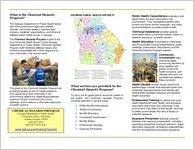What is the Chemical Hazards Program?
The Georgia Department of Public Health works with other government agencies, elected officials, community leaders, business and industry, residents, organizations, and others to address public health issues in Georgia. The Chemical Hazards Program is part of the Environmental Health Branch of the Georgia Department of Public Health. Chemical Hazards Program staff members address issues and concerns associated with human exposure to toxic chemicals in the environment.
The goals of the Chemical Hazards Program are to identify people at risk for health problems from exposure to toxic chemicals in the environment, determine relationships between exposure to toxic chemicals and human diseases, and to reduce or eliminate exposures of health concern.
CHEMICAL HAZARDS PROGRAM
Georgia Department of Public Health 2 Peachtree Street, 13th Floor Atlanta, Georgia 30303 (404) 657-6534 (404) 657-6533 (Fax)
www.dph.ga.gov/chemical-hazards
GEORGIA PUBLIC HEALTH DISTRICTS
What services are provided by the Chemical Hazards Program?
To carry out its goals and to serve the needs of the public, the Chemical Hazards Program conducts activities in several areas:
Public Health Assessments Technical Assistance Health Education Community Involvement Health Studies Professional Training Exposure Prevention
Public Health Consultations evaluate a site
where there are toxic chemicals in the environment. They investigate possible past, current and future human exposure, and make recommendations to protect public health.
Technical Assistance provides specific
information about a chemical release, known or potential exposure, or health concern.
Health Education is provided to individuals
and communities through presentations, public meetings, publications, discussions, and the Chemical Hazards Program website.
Community Involvement helps
and encourages community members to work together and gather community health concerns, and develop and carry out activities that address these concerns.
Health Studies involve human health and
epidemiologic studies that evaluate known and potentially exposed people, and identify any relationships between exposure and adverse health outcomes.
Professional Training for district and local
health department staff, health care providers, and others about how toxic chemicals in the environment may affect human health, and how to better communicate the risks of actual or potential exposure.
Exposure Prevention activities promote
wellness and resource conservation, including hazardous household chemical reduction, illegal laboratory exposures, emergency preparedness, and fish and seafood consumption guidance.
Chemical Hazards Program Publications
BROCHURES
Brownfields and Public Health Cancer and the Environment Chemical Hazards Program Chemical Hazards Program Internships Georgia Environmental Health Careers Health Effects of Odors Healthy Urban Gardening Integrated Pest Management for Homes Landfill Gas and Odors Naturally Occurring Asbestos in Georgia Neighborhood Chemical Swap Programs Potential Long-Term Health Effects of Carbon Monoxide Radium & Uranium in Public Drinking Water Supplies Radon and Public Health Recycle Your Analog Television Recycling and Reusing Scrap Tires Safe Alternative to Common Household Chemicals Uranium in Private Water Wells Well Water Quality and Testing Women in Environmental Careers (WeCareers.org) Women's Guide to Eating Fish and Seafood
Fish Consumption Guidance (English and Spanish) Eating Fish from Coastal Georgia Eating Fish from Coosa, Etowah, Oostanaula Rivers Eating Fish from Mid and South Georgia Eating Fish from North Georgia
FACT SHEETS
Arsenic in private well water BP Deepwater Horizon Oil Spill Common Health Concerns about Crematory Operations Hazardous Household Chemical Reduction Household Hazardous Waste Reduction Lead in Soil Mercury in Air Proper Use of Naphthalene Pest Control Products Proper Well Abandonment Propyl Mercaptan and Ethoprop in Air SoilSHOP Soil Screening
Chemical Hazards Program Georgia Department of Public Health 2 Peachtree Street NW, 13th Floor Atlanta, GA 30303-3142
CHEMICAL HAZARDS PROGRAM
Environmental Health Section
